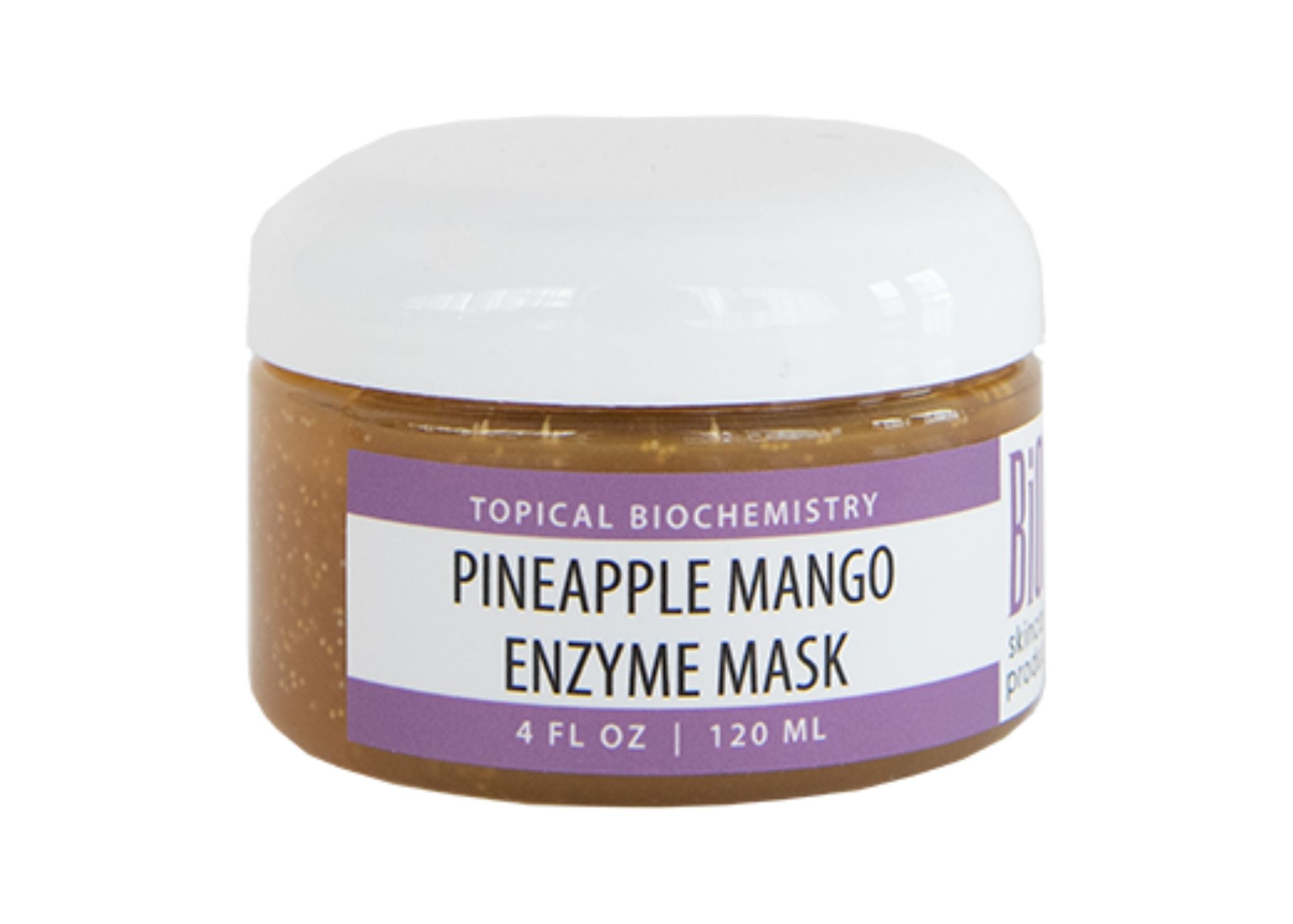What Are Fruit Enzymes
Fruit Enzymes are becoming one of the most popular options for professional exfoliation in the treatment room. The wide variety of fruit options gives skincare professionals ways to treat many different skin types and skin conditions. Although enzymes have different benefits for the skin, the main thing an enzyme does for the skin is exfoliate. It breaks down the keratin protein in the upper layers of the skin that bonds skin cells together, which provides a “digestive” type of exfoliation on the skin. Which differs from other popular types of exfoliators such as fruit acids (Mandelic, Lactic, Glycolic) that provide a lifting or sluffing of dead skin cells. Common fruit enzymes used are combinations of pineapple, mango, papaya, pomegranate, and pumpkin.
What Fruit Enzymes Can Do for the Skin
Generally, you will see overall skin improvement when using fruit enzymes. Significant exfoliation, a healthy-looking complexion, bacterial control, and age management. Because of their gentle nature, enzyme masks are ideal for all skin types, including sensitive skin. As mentioned before, the main purpose of the enzyme mask is to exfoliate the skin. However, each fruit enzyme will have natural benefits for the skin.

BiON Skincare
Pineapple Mango Enzyme Mask
A gentle, active exfoliant for normal to oily skin types, as well as problematic and mature skin. The six main ingredients work to exfoliate the skin naturally. Salicylic Acid prevents pores from clogging and helps fade the appearance of inflamed skin. It is rich in antioxidants, Vitamin C, beta-carotene, and flavonoids, and the Mango Seed Butter, with its high content of fatty acids, assists with moisturization.
Pineapple enzymes (also known as bromelain) has antibacterial, antimicrobial and anti-inflammatory benefits, making it appropriate for problematic or acne prone skin types. BiON’s Pineapple Mango Enzyme Mask is a gentle, yet affective treatment mask with 2% Salicylic Acid added to boost bacterial and excess sebum control.
Papaya is a powerhouse enzyme that reduced signs of aging, controls bacteria and reduces hyperpigmentation and dark spots. BiON’s Pomegranate Papaya Enzyme Mask has a luxurious creamy base that adds hydration to the skin and is appropriate for all skin types, including sensitive skin.
The popular aroma of a pumpkin enzyme mask not only makes it a popular option for fall, but should also be used year-round due to the collagen stimulating benefits of vitamin a and vitamin C that are naturally found in pumpkin puree. Using BiON’s Pumpkin Enzyme Mask, you can expect a brighter complexion, anti-aging benefits and skin rejuvenation.
How to use Fruit Enzymes in Professional Treatments
Enzyme masks are traditionally used in facial during the exfoliation step, after cleansing and analyzing the skin. BiON’s enzyme masks can all be used with or without steam and are generally going to be left on the skin for 10-15 minutes. However, it is always important to follow your manufacturer’s directions and recommendations.

Contribution by Andrea Matczyszyn
Andrea has contributed many articles to Lipgloss + Aftershave. Andrea is BiON Skincare’s Licensed Esthetician and Director of Sales & Product Education. In this role, Andrea manages incoming orders and provides support to our licensed professionals on a day-to-day basis. She also attends trade shows to be there hands-on for our customers and to provide education and recommendations on how to use our products. As a big believer in BiON Skincare and our mission, Andrea supports our family-owned and operated business by holding herself to the same level of customer service standards that our customers have come to know over the past 20+ years of being in business.
Andrea has held an Esthetician license for over 9 years now. She attended esthetics school right here in Lincoln, NE at College of Hair Design in July 2011, graduating in December 2011. After graduation, she moved to Colorado where she quickly became the Lead Esthetician at her first esthetics job. After a few years in Colorado, she moved back to Nebraska to be closer to family and has been working in the business industry since. Passionate about skincare and its ever-changing world, Andrea is excited to be able to work with so many different licensed professionals around the world to help grow and learn from each other.
Because there is such a variety of different fruit enzymes and combinations to choose from, you can change them to add a unique experience for your client’s monthly facials. They add an aromatic quality to your facials that you cannot always get from traditional/manual exfoliation methods. Create fun fall facials using a pumpkin enzyme. Glowing summer facials using pineapple and mango. And a hydrating winter facial using pomegranate and papaya. Between the dynamic combination and the versatility in skin types that tolerate enzymes, the options are endless for professional exfoliation using fruit enzymes.
Unconventional Ways to use Fruit Enzymes in the Treatment Room
The gentle exfoliation of enzymes makes them a great addition to “boost” other professional treatment such as dermaplaning, microdermabrasion, chemical peels, and micro-needing to name a few. Depending on the results you are looking to achieve and your client’s sensitivity you can apply the enzyme either before or after the chosen manual exfoliating option for additional exfoliation benefits and more dramatic results. More unique ways would be to add them to body treatments such as back facials, vajacials, and booty facials. Reminder to always follow your manufacturer’s recommendations when using facial enzymes and always know you client’s general sensitivity level before adding additional exfoliation to treatments.
All in All
Fruit Enzymes create a gentle and natural option for exfoliation in the treatment room. The multiple uses and different types of fruit acids give options to treat different skin types and skin conditions. All in all, enzymes should be a staple product in every skincare professional’s treatment room.

